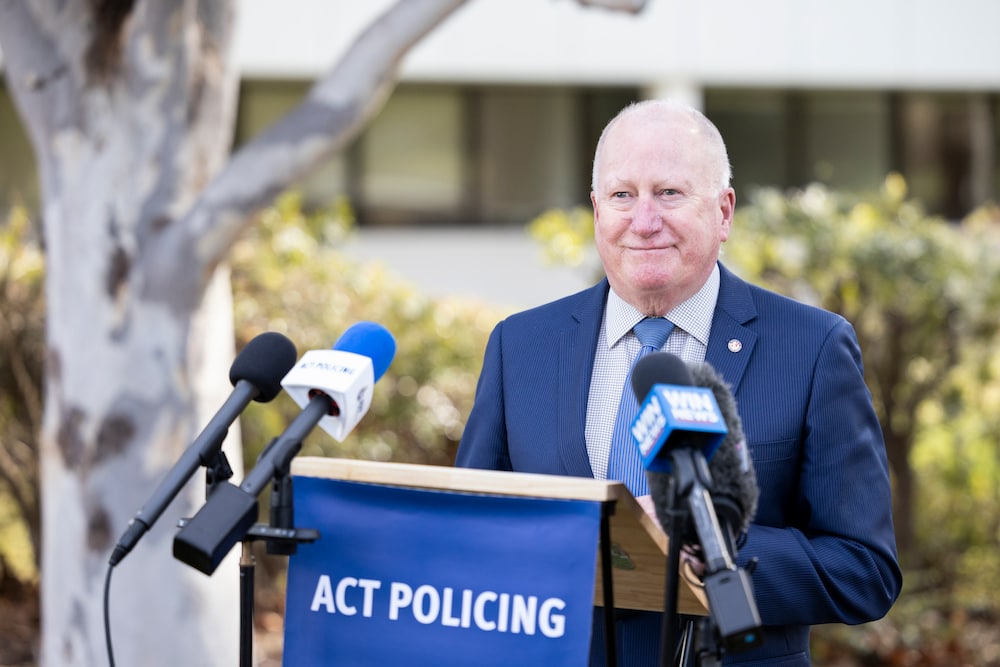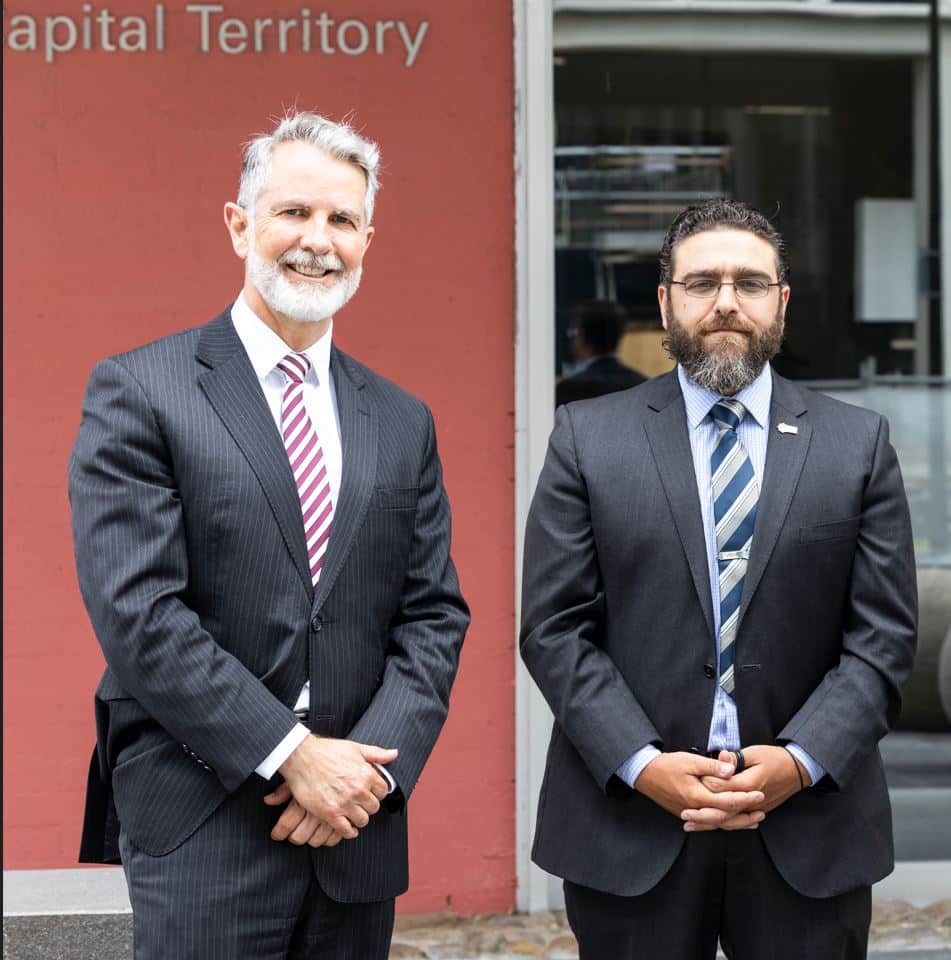The ACT does not have enough police officers to protect and serve its growing population, unions and the Canberra Liberals each argue, appalled by the grim picture the Report on Government Services, produced by the Australian Government’s Productivity Commission, paints: the ACT trails the rest of the nation by many measures.
- For a more in-depth analysis of the data, see ROGS: ACT police funding and numbers lowest in Australia
Despite an overall increase in expenditure and staffing, the ACT has the fewest police officers and the lowest recurrent expenditure per 100,000 people in the country, the 2021–22 data shows. The ACT has the consistently lowest rate for clearance of property offences, for the 10th year running. Crime rates for sexual assault and motor vehicle theft have increased. Magistrates court decisions resulting in the conviction of defendants are the lowest in the nation. And the ACT public’s satisfaction with services provided by police is at its lowest in 10 years.
However, ACT residents place high trust in police integrity, and generally consider the ACT a safe place to live.
The Australian Federal Police Association wants the ACT Government to fund another 300 ACT Policing employees: 250 sworn officers and 50 civilians. AFPA President Alex Caruana attributed the issues raised in the ROGS data to a shortage of police and funding.
Shadow police minister, Canberra Liberals MLA Jeremy Hanson, accused Chief Minister Andrew Barr and Greens leader Shane Rattenbury of deliberately defunding the police. He urged the government to review the crime and justice systems, and properly resource and support the police.
Mick Gentleman, ACT Minister for Police and Emergency Services, said that Canberra was a safe city. The government had invested more than $33 million in police in 2019–20 to reform the police, and recruit 69 staff; more than 40 were recruited last year. The government would review resourcing for police as the ACT grew, Mr Gentleman promised.
“On behalf of the ACT Government, I would like to thank our police officers for their service and dedication – together we will ensure that Canberra remains a safe city,” Mr Gentleman said.
Police staffing
The ACT has 20,000 more people than it did a decade ago. The number of actual police has increased by 119 since 2012-13 (from 974 to 1,093). Operational numbers per 100,000, however, have fallen (from 231 in 2012-13 to 205 in 2021-22), and are the lowest in the nation for the 10th year in a row.
“The data again highlighted what the AFPA has been saying for a long time – ACT Policing needs more officers,” Mr Caruana said.
In August, for instance, Mr Caruana described police as “fatigued and already stretched, which is influencing morale”.
Last February, the ACT Government rejected a motion by Mr Hanson to increase the number of police to match per-capita levels with NSW, and to adequately resource ACT Policing to re-establish face-to-face crime reporting and investigation. (In 2021, ACT Policing introduced an online reporting system for property crimes – due, Mr Hanson said at the time, to a shortage of police.)
- Liberals say Molonglo Valley needs a police station (30 August 2022)
- No bill for the Old Bill: Liberal motion comes a-copper (10 February 2022)
- ACT Policing to expand online reporting for property crimes (1 December 2021)
Police services expenditure
The ACT Government’s recurrent expenditure on police services was $26.9 million more in 2021–22 ($202.4 million) than in 2012–13 ($175.5 million) – but real recurrent expenditure per person fell by $24.90 per person (from $477.57 in 2012-13 to $452.67 in 2021-22). It is more than $120 below the national average, and is the lowest in the Australia for the fourth year running.
“The ACT Government will continue to review resourcing ACT Policing as the territory grows,” Mr Gentleman said.
The ACT Government, Mr Gentleman stated, had already significantly boosted police funding as part of a phased transformation of ACT Policing. In 2019–20, the ACT Government invested $33.9 million, the largest investment in ACT Policing that decade, to introduce a system-wide approach to crime prevention, disruption, and response, and recruit 69 more police.
“These reforms will enable more police on the street and boost police numbers,” Mr Gentleman said.
Phase one recruited 60 additional staff; 42 recruits joined last year.
Convictions
Only 65.7 per cent of magistrates court decisions resulted in a guilty outcome for defendants in 2020-21. This is the lowest rate in the nation, more than 30 points below the national average (97.2 per cent). But only two years before, in 2018-19, 91.8 per cent of magistrates court decisions resulted in a guilty outcome.
Mr Caruana said the data from the judiciary and courts was concerning.
“This data highlights the reason why we need an independent inquiry into the judicial system in the ACT,” he said. “Why has the conviction rate dropped from the 90 per cent range to the mid 60 per cent range?”
Last year, the AFPA, the Canberra Liberals, and bereaved parent Tom McLuckie called for bail and sentencing to be reformed; recidivist offenders were being granted bail or given light sentences, putting the public at risk, Mr Caruana said then. But the government rejected Jeremy Hanson’s motion for an independent review.
- Reform of bail and sentencing in ACT needed, AFPA says (25 August 2022)
- Fight for independent review of bail is not yet over (12 October 2022)
Satisfaction with police
The general population’s satisfaction with services provided by the police is at its lowest in 10 years: 76.3 per cent in 2021-22, down from 80.8 per cent in 2020-21. Those who have had contact with police in the last 12 months are more satisfied than they were in the previous two years, however.
Mr Caruana believed the drop in community satisfaction was linked directly to officer numbers.
“Of course people aren’t going to be satisfied if police take a long time to turn up, or take a long time to investigate an incident,” he said. “This is a direct result of police being too thin on the ground, and having to go job-to-job and becoming overworked.”
However, police rate highly on integrity and trust. 85.5 per cent of Canberrans believe police perform their job professionally (the second highest rating in Australia); 73.2 per cent believe police are honest (the highest rating); and 69 per cent believe police treat people fairly and equally.
“In community policing, integrity and trust is important, and this data portrays the ACT Policing workforce positively,” Mr Caruana said.

ACT Government: Canberra is a safe city
Police minister Mick Gentleman said that the ACT was a unique jurisdiction where resources could easily be moved around.
“Our police do an excellent job ensuring that incidents of crime remain low, and that they are responded to quickly when they do occur,” Mr Gentleman said.
ROGS data, he noted, showed that Canberrans have some of the highest perceptions of safety at home and in public places. The ACT leads the nation on people who feel safe at home alone during the night, walking alone in their neighbourhood during the day, and on public transport during the night, and ranks equal second on people who feel safe walking alone in their neighbourhood during the night.
The ACT has low crime rates compared to other jurisdictions, and the number of offences reported to police in the last decade decreased by 11 per cent, Mr Gentleman continued.
Police union: Canberra needs more officers
Mr Caruana was not convinced.
“The ACT has consistently been the lowest ranking jurisdiction in the nation when it comes to police officers per 100,000 population,” he said.
“The ACT Government uses the tired excuse of a small geographical jurisdiction and low crime rates. The Government doesn’t acknowledge that the workload or ‘calls to service’ of ACT Policing has increased, putting pressure on an already thin blue line.”
Mr Caruana insists that the ACT Government must fund another 300 ACT Policing employees: a mixture of 250 sworn and 50 civilians.
“The ACT gets a premier law enforcement agency in ACT Policing and the AFP,” he said. “ACT Policing can draw on AFP specialist skills if required. The AFP has some world-leading investigators on its books, and the ACT community benefits from this.”
Canberra Liberals: Investigation needed
Jeremy Hanson MLA, shadow police minister, said the ACT Government must urgently address serious issues in the police and justice system.
“After a year of tragic incidents and desperate calls from the police for more support, the latest statistics show deliberate government defunding that is the root cause of many of the problems,” Mr Hanson said.
The report, Mr Hanson noted, showed the ACT had the lowest number of police per capita in the country, the lowest spend per capita for police in the country, the lowest number of guilty convictions in the country, the lowest magistrate court finalisations in the country, and the lowest clearance rate for property crime in the country. The ACT was the only jurisdiction to record a negative average annual growth rate in real recurrent expenditure, and there were fewer sworn officers in the ACT now than 10 years ago, despite a substantial increase in population.
“This is not an accident,” Mr Hanson said. “This is a deliberate decision by the Barr-Rattenbury government to defund this vital service.
“That’s why I am calling on this government, again, to do a full review into the crime and justice system in the ACT, and give the police the resources and support so they can properly do their job to keep everyone in our community safe.”
Mr Caruana acknowledged that while Mr Gentleman often fought for ACT Policing in Cabinet, decisions were made by the entire Cabinet.
“The AFPA believes that for too long, ACT Policing hasn’t been a priority for the ACT Government, and this reflects in funding and resources,” Mr Caruana said.



